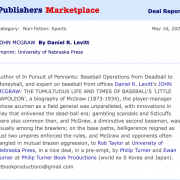Two NYC Mayors, Falsely Lionized/Part II
Since last October when I wrote about what I view as the false lionization of New York City mayors Bloomberg and Giuliani by much of the national media, I’ve kept an eye out for stories of their conduct in office that underscores the points I made in that post last fall, when I wrote this paragraph:
“As mayor, Rudolph Giuliani was a daily irritant in the city, continually choosing confrontation over conciliation, seldom missing a chance to stoke the embers of urban enmity–between the police and the people; black and white citizens; between Manhattanites and residents in the other boroughs. On and on it went, year after year. When Abner Louima was sodomized by members of the NYPD, a word of apology never crossed that mayor’s lips. The same was true when Amadou Diallo was shot by police. Giuliani picked fights with museums and routinely showed contempt for free speech and free expression. It was like being trapped in a room with an unremittingly argumentative neighbor.”
I go on to say that after 9/11 it was as if national reporters hadn’t ever read one of the reams of story on Rudy’s meanness and divisiveness. Please note, it was often different for many hometown NY-based reporters, who tended to cover his high drama hijinks more honestly. So I perked right up today, when I saw this tweet from NY Times reporter Michael Powell:
A cautionary tale about indulging in Rudy Giuliani nostalgia. How he tried to ruin a good man, Richard Murphy: nytimes.com/2008/01/22/us/…
— Michael Powell (@powellnyt) February 17, 2013
I’ve now read that story, co-bylined with reporter Ross Buettner, headlined “In Matters Big and Small, Crossing Giuliani Had a Price,” in which they reported on the mayor’s vindictiveness in striking back at people he considered his enemies. As stated in the tweet, one of the people against whom Giuliani unleashed one of his many vendettas was Richard Murphy, whose recent death, marked this week by a NYT obituary, probably prompted Powell to tweet about the still pertinent article, a litany of abuse of power and petty payback in which Giuliani administration officials painted Mr. Murphy–formerly a youth services advocate in the administration of Mayor Dinkins, preceding Guliani–as corrupt, though there was no basis for this insinuation. They even bad-mouthed him to a prospective employer in California, a job he then wasn’t offered. From the 2008 article:
“I was soiled merchandise—the taint just lingers,’ Mr. Murphy said in a recent interview. Not long after, a major foundation recruited Mr. Murphy to work on the West Coast. The group wanted him to replicate his much-honored concept of opening schools at night as community centers. A senior Giuliani official called the foundation—a move a former mayoral official confirmed on the condition of anonymity for fear of embarrassing the organization—and the prospective job disappeared. ‘He goes to people and makes them complicit in his revenge,’ Mr. Murphy said.”
As for Mayor Bloomberg, even while supporting some of his initiatives, such as his advocacy of stricter gun regulations and the installation of more bike lanes around the city, his anti-democratic hubris in arranging city law to permit himself a third term continues to place him under a cloud. His State of the City address last week was a model of Bloombergian megalomania, with the Brooklyn Nets cheerleaders dancing before he took to the podium, where pennants and balloons festooned the Barclays Center. The colossally nervy message of his speech, according to this Feb. 13 NYT article, was that after he leaves his office, the city may be taken over by special interests, as if we’ve been free of them the past decade he’s held office.
“In an unabashed and relentless tribute to his own municipal stewardship, Mayor Michael R. Bloomberg on Thursday declared victory over 12 years of ‘obstructionists’ and ‘naysayers’ who sought to block his vision for New York City, and warned that an era of political independence might leave City Hall when he did. From the floor of the Barclays Center in Brooklyn—itself a monument to his ambitious and controversial development agenda—Mr. Bloomberg delivered his final State of the City address with a vow not to retreat into a state of ribbon-cutting resignation. . . . ‘The special interests and campaign donors have never had less power than they’ve had over the past 11 years,’ he said, alluding to his ability, because of his personal wealth, to refuse campaign donations. ‘And this year, we’re going to show them just how true that is . . . . ‘Given all the politics and special interests, if we don’t do it this year, it may never get done,’ he said of his proposed rezoning plan for the area around Grand Central Terminal, intended to encourage the construction of modern towers.”
So, a mayor who’s been a ceaseless proponent of ever-more development and an ally of to real estate interests, claims the city may suffer once his stewardship ends. To this malarkey, I echo these comments, quoted in the story on the Barclays Center extravaganz:
“’He still doesn’t understand that the city was here before him and will be here after he leaves,’ said Bill de Blasio, the public advocate and a Democratic candidate for mayor. ‘I heard a lot of creating temples to his greatness.’”
While I believe that the media have often contributed to the false lionization of these mayors, I am grateful to reporters Powell and Buettner, and the Timesmen who wrote the story on the State of the City speech, Michael M. Grynbaum and Michael Barbaro.



Leave a Reply
Want to join the discussion?Feel free to contribute!